Betrayal
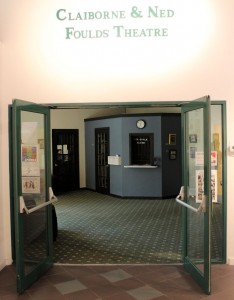 Nine performances of Betrayal come to the Alliance for the Arts’ Foulds Theatre on October 3, 4, 9, 10 , 11, 12 (matinee), 16, 17 and 18. All Theatre Conspiracy performances take place on Thursday, Friday and Saturday nights at 8 p.m., with the Sunday matinee on October 12 starting at 2 p.m. ng at 7:30 and the show starting promptly at 8:00 p.m. Individual tickets are $22 each. Student tickets are $11. Thursdays are “buy one get one half off,” and opening night is “pay what you will” – you name the ticket price! Season subscriptions are available. You can buy the remaining 7 shows for $112 ($16 per ticket) or 6 shows for $102 ($17 per ticket) or 5 shows $90 ($18 per ticket) or just 4 shows $80 ($20 per ticket). Tickets can be purchased by calling Theatre Conspiracy’s box office at 239-936-3239 or by visiting www.theatreconspiracy.org.
Nine performances of Betrayal come to the Alliance for the Arts’ Foulds Theatre on October 3, 4, 9, 10 , 11, 12 (matinee), 16, 17 and 18. All Theatre Conspiracy performances take place on Thursday, Friday and Saturday nights at 8 p.m., with the Sunday matinee on October 12 starting at 2 p.m. ng at 7:30 and the show starting promptly at 8:00 p.m. Individual tickets are $22 each. Student tickets are $11. Thursdays are “buy one get one half off,” and opening night is “pay what you will” – you name the ticket price! Season subscriptions are available. You can buy the remaining 7 shows for $112 ($16 per ticket) or 6 shows for $102 ($17 per ticket) or 5 shows $90 ($18 per ticket) or just 4 shows $80 ($20 per ticket). Tickets can be purchased by calling Theatre Conspiracy’s box office at 239-936-3239 or by visiting www.theatreconspiracy.org.
In this section, you will find articles about the play, playwright, director and upcoming production of the show at the Theatre Conspiracy (posted in reverse date order from latest to oldest).
* * * * * * * * * * * * * * * * * * * * * * * * * * * * * * * * * * * * * * *
James Recca’s portrayal of Robert in Theatre Conspiracy’s ‘Betrayal’ leaves it up to audience to fathom his motivations (10-17-14)
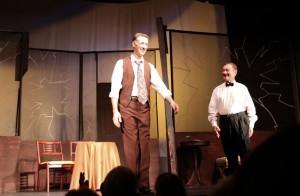 James Recca plays Robert in Theatre Conspiracy’s production of Howard Pinter’s Betrayal. Recca was last seen at Theatre Conspiracy opposite Lab Theater’s Annette Trossbach as Toby Teasedale and Lionel Hepplewick in Intimate Exchanges. Theatre Conspiracy audiences may also remember him as the Russian spy in See How
James Recca plays Robert in Theatre Conspiracy’s production of Howard Pinter’s Betrayal. Recca was last seen at Theatre Conspiracy opposite Lab Theater’s Annette Trossbach as Toby Teasedale and Lionel Hepplewick in Intimate Exchanges. Theatre Conspiracy audiences may also remember him as the Russian spy in See How 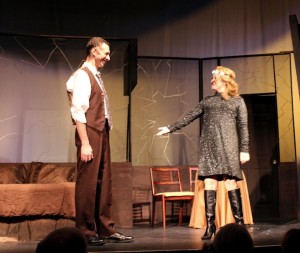 They Run. In other local theaters, the has reprised such roles as Salieri in Amadeus, Satan, the Court Bailiff and Simon the Zealot in The Last Days of Judias Iscariot, Sweeney in Sweeney Todd, Quixote in Man of LaMancha, and the leads in The Fantasticks and Little Shop of Horrors.
They Run. In other local theaters, the has reprised such roles as Salieri in Amadeus, Satan, the Court Bailiff and Simon the Zealot in The Last Days of Judias Iscariot, Sweeney in Sweeney Todd, Quixote in Man of LaMancha, and the leads in The Fantasticks and Little Shop of Horrors.
A graduate of The American Musical and Dramatic Academy, James has directed Lab Theater’s The Altruists and Bob: A Life in Five Acts as wells as 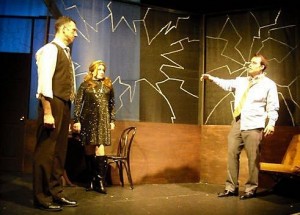 community theater shows in New York that included Guys and Dolls, True West, and Joseph and the Amazing Technicolor Dreamcoat.
community theater shows in New York that included Guys and Dolls, True West, and Joseph and the Amazing Technicolor Dreamcoat.
Recca’s portrayal of Robert in Betrayal is particularly strong. He aptly captures playwright Howard Pinter’s fascination not just with his wife’s betrayal of their love and marriage, but Robert’s friendship with her paramour, Jerry,  whose relationship apparently predates Robert’s romance and marriage with his fashionable, free-spirited, go-go-booted and big hair wife Emma, who Robert virtually gives to his best man/best friend sometime shortly after their nuptials in 1968. Of course, while this represents the starting point of the affair, the audience does not learn how Emma and Jerry’s tryst got its start until the play’s final act. Even then, no explanation is given why Robert
whose relationship apparently predates Robert’s romance and marriage with his fashionable, free-spirited, go-go-booted and big hair wife Emma, who Robert virtually gives to his best man/best friend sometime shortly after their nuptials in 1968. Of course, while this represents the starting point of the affair, the audience does not learn how Emma and Jerry’s tryst got its start until the play’s final act. Even then, no explanation is given why Robert 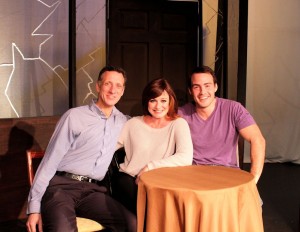 seemingly sanctions Emma and Jerry’s union, and Recca skillfully plays up his character’s enigmatic, unfathomable behavior through each of the scenes in the play.
seemingly sanctions Emma and Jerry’s union, and Recca skillfully plays up his character’s enigmatic, unfathomable behavior through each of the scenes in the play.
“Robert likes to always hold his cards close to his chest,” notes Recca. “He only puts out just what he needs in order to get the information he is after.” And in this vein, Recca/Robert keeps the audience 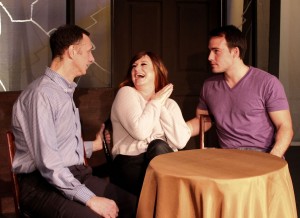 in the dark as to why he gets so upset with Emma upon receiving confirmation that she is screwing around with Jerry when he himself has had a string of his own affairs behind her back or why he impregnates her even though he suspects/knows that Emma and Jerry carrying on behind his back.
in the dark as to why he gets so upset with Emma upon receiving confirmation that she is screwing around with Jerry when he himself has had a string of his own affairs behind her back or why he impregnates her even though he suspects/knows that Emma and Jerry carrying on behind his back.
Knowing how the affair starts and ends, it would be understandable and forgivable if Recca betrayed 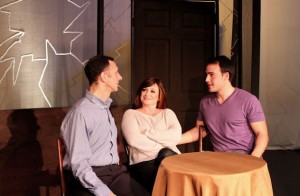 the reasons why Robert says and does the things that he does. But Recca is far too professional for that. He holds his own cards close to the vest and refrains from supplying any hint of motivation, requiring the audience to speculate about why Robert apparently cares more about Jerry’s betrayal of their friendship than Emma’s betrayal of her fidelity and the sanctity of their marital bed.
the reasons why Robert says and does the things that he does. But Recca is far too professional for that. He holds his own cards close to the vest and refrains from supplying any hint of motivation, requiring the audience to speculate about why Robert apparently cares more about Jerry’s betrayal of their friendship than Emma’s betrayal of her fidelity and the sanctity of their marital bed.
 Across town at Lab Theater in Deathtrap, playwright Ira Levin turns his turned his characters Sidney and Clifford loose to explore their openly gay relationship. But in Betrayal, the specter of Robert’s physical attraction to Jerry is implied – except for a seemingly throw-away line where Robert tells Emma that perhaps he should
Across town at Lab Theater in Deathtrap, playwright Ira Levin turns his turned his characters Sidney and Clifford loose to explore their openly gay relationship. But in Betrayal, the specter of Robert’s physical attraction to Jerry is implied – except for a seemingly throw-away line where Robert tells Emma that perhaps he should 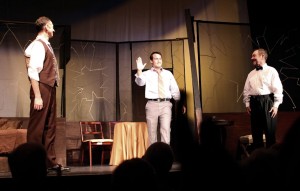 have had an affair with Jerry himself. Off-stage, Recca acknowledges the possibility, but if he believes that this is the solution to the riddle that is Robert he does not let it influence his portrayal of the character. Still, what better explanation for Robert’s cold, calculating and manipulative treatment of Emma and his volatile, emotional,
have had an affair with Jerry himself. Off-stage, Recca acknowledges the possibility, but if he believes that this is the solution to the riddle that is Robert he does not let it influence his portrayal of the character. Still, what better explanation for Robert’s cold, calculating and manipulative treatment of Emma and his volatile, emotional, 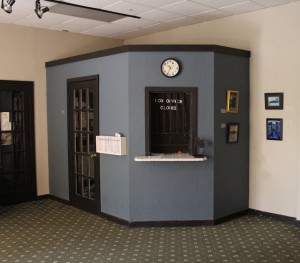 even drunken indulgence of Jerry’s dalliance with his wife than Robert’s growing dissatisfaction and desperation over his unrequited love for his duplicitous best friend? And since men in the 1970s typically denied their gay yearnings even to themselves, the only way that Jerry could embrace his reciprocal love for Robert than through the common denominator of Robert’s wife, Emma. After all, everyone learned as a result of the AIDS epidemic that from an epidemiological
even drunken indulgence of Jerry’s dalliance with his wife than Robert’s growing dissatisfaction and desperation over his unrequited love for his duplicitous best friend? And since men in the 1970s typically denied their gay yearnings even to themselves, the only way that Jerry could embrace his reciprocal love for Robert than through the common denominator of Robert’s wife, Emma. After all, everyone learned as a result of the AIDS epidemic that from an epidemiological  perspective, you’ve had sex with everyone your sexual partner had sex with too.
perspective, you’ve had sex with everyone your sexual partner had sex with too.
Pinter provides no excuses or explanations for his characters’ actions beyond their own desires. There is no mistreatment, estrangement, or incompatibility to create the sympathetic framework that so often accompanies a fictional affair. Pinter’s characters are intelligent, witty, well-read, and sophisticated. There is really little else to explain why Robert gives his bride to Jerry and why Jerry carries on for seven years with the wife of his supposed best friend than that the two men are engaged in a sexual relationship with each other through the conduit of Emma.
And what of Emma? Is she a unwitting shill or does she have an agenda of her own? At first blush, Emma appears to be a pawn caught up in the tangled relationship between the two men. She feels excluded by their relationship and is increasingly irritated by their games of squash and bachelor lunches. And Recca’s Robert lets her know in no uncertain terms that even though she and Jerry are having an elicit relationship, it’s his relationship with Jerry that’s of paramount importance. “I mean a game of squash isn’t simply a game of squash, it’s rather more than that,” Robert tells her. “You see, first there’s the game. And then there’s the shower. And then there’s the pint. And then there’s lunch …. You don’t actually want a woman within a mile of the place, any of the places, really.” But the times they are changing, and over time, Emma finds her own groove, starting a career, finding her own voice and entering into her own affair with one of Jerry’s clients.
It’s a tribute to Recca’s acting skills that his performance and portrayal of Robert that he leaves the equally plausible possibilities for the ultimate evaluation of each member of the Theatre Conspiracy audience. Be sure to come out tomorrow night for the final performance of Betrayal and decide for yourself. Individual tickets are $22 each. Student tickets are $11. Tickets can be purchased by calling Theatre Conspiracy’s box office at 239-936-3239 or by visiting www.theatreconspiracy.org.
______________________________________________________________________
Internationally-trained Pattie Ford plays Emma in Howard Pinter’s ‘Betrayal’ (10-16-14)
 Pattie Ford is Emma in Theatre Conspiracy’s production of Harold Pinter’s Betrayal. Pattie includes among her credits are national and international tours as Val in A Chorus Line and as Baayork Lee’s Dance Captain, as well as national tours of Phantom (Meg), Gypsy (Louise), A Funny Thing Happened on the Way to the Forum, Fiddler on the Roof, Spider Man Live! and The Best Little
Pattie Ford is Emma in Theatre Conspiracy’s production of Harold Pinter’s Betrayal. Pattie includes among her credits are national and international tours as Val in A Chorus Line and as Baayork Lee’s Dance Captain, as well as national tours of Phantom (Meg), Gypsy (Louise), A Funny Thing Happened on the Way to the Forum, Fiddler on the Roof, Spider Man Live! and The Best Little 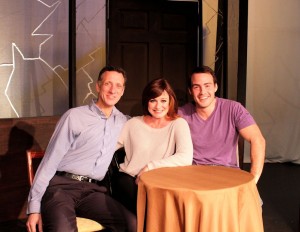 Whorehouse in Texas (which starred Ann-Margaret). Pattie has studied at the Walnut Street Theater Company in Philadelphia, and extensively in New York City, Milan, Zurich and Paris, which gives her a unique slant on the European sensibility evinced by Betrayal’s plot, characterization and dialogue. Ford is a proud member of the Broadway Palm staff, and is married to the dashing Whitney Wilcox.
Whorehouse in Texas (which starred Ann-Margaret). Pattie has studied at the Walnut Street Theater Company in Philadelphia, and extensively in New York City, Milan, Zurich and Paris, which gives her a unique slant on the European sensibility evinced by Betrayal’s plot, characterization and dialogue. Ford is a proud member of the Broadway Palm staff, and is married to the dashing Whitney Wilcox.
_________________________________________________________________________________
‘Betrayal’ filled with memorable show-stealing scenes that let actors push artistic envelopes (10-15-14)
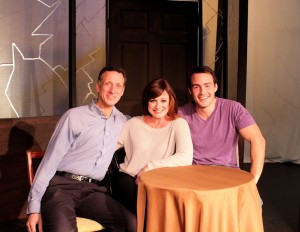 Betrayal concludes its run at Theatre Conspiracy this weekend with performances on October 16, 17 and 18. If you have not yet taken in this exceptional show, it’s a performance you really don’t want to miss. Tickets can be purchased by calling Theatre Conspiracy’s box office at 239-936-3239 or by visiting www.theatreconspiracy.org.
Betrayal concludes its run at Theatre Conspiracy this weekend with performances on October 16, 17 and 18. If you have not yet taken in this exceptional show, it’s a performance you really don’t want to miss. Tickets can be purchased by calling Theatre Conspiracy’s box office at 239-936-3239 or by visiting www.theatreconspiracy.org.
The plot provides a poignant look back at a 7-year 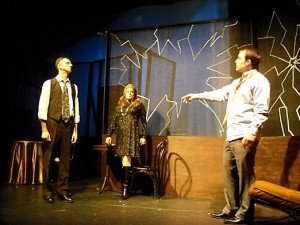 affair between a gallery owner by the name of Emma and her husband’s literary agent best friend, Jerry. Set in England, the interactions and relationships between Emma, her husband Robert, and his buddy Jerry possess a decidedly continental sensibility replete with the psychological intrigue and curious gamesmanship that made U.S. audiences fall head-over-heels in love with such British psycho-dramas as Don’t
affair between a gallery owner by the name of Emma and her husband’s literary agent best friend, Jerry. Set in England, the interactions and relationships between Emma, her husband Robert, and his buddy Jerry possess a decidedly continental sensibility replete with the psychological intrigue and curious gamesmanship that made U.S. audiences fall head-over-heels in love with such British psycho-dramas as Don’t 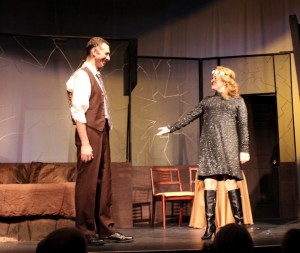 Look Now, Rebecca and The War Zone. After all, if an American publisher, movie mogul or hedge fund manager discovered that his best friend was boffing his wife, he’d likely set out to ruin his BFF financially – if he didn’t shoot him dead instead. But Brits are more philosophical and sophisticated about affairs of the heart than we Americans. Or at least they were back in the 1970s, which is the period during which Betrayal takes place.
Look Now, Rebecca and The War Zone. After all, if an American publisher, movie mogul or hedge fund manager discovered that his best friend was boffing his wife, he’d likely set out to ruin his BFF financially – if he didn’t shoot him dead instead. But Brits are more philosophical and sophisticated about affairs of the heart than we Americans. Or at least they were back in the 1970s, which is the period during which Betrayal takes place.
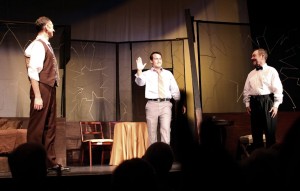 “[Director] Rick Sebastian pointed out that it wasn’t atypical in the ’70s for the British to be a little more freegoing,” notes Greg Sofranko, who plays the role of Jerry.
“[Director] Rick Sebastian pointed out that it wasn’t atypical in the ’70s for the British to be a little more freegoing,” notes Greg Sofranko, who plays the role of Jerry.
“But it is not only the time period,” counters James Recca, who reprises the role of Robert, whom the audience discovers is having his own affairs 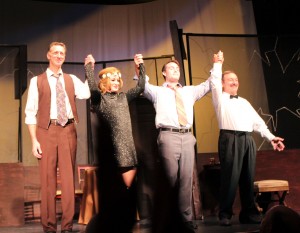 behind his wife’s back. “So how can he fly off the handle? Plus, he likes to always hold his cards close to his chest. He only puts out just what he needs in order to get the information he is after.” How British of him – or perhaps it’s just that his character accurately reflects the persona of a publisher, for whom playing people is an amusing past-time if not an occupational hazard.
behind his wife’s back. “So how can he fly off the handle? Plus, he likes to always hold his cards close to his chest. He only puts out just what he needs in order to get the information he is after.” How British of him – or perhaps it’s just that his character accurately reflects the persona of a publisher, for whom playing people is an amusing past-time if not an occupational hazard.
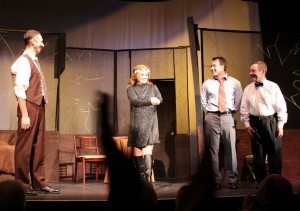 Pattie Ford turns in a terrific performance as Emma. Having lived, worked, studied and performed in Milan, Zurich and Paris, Ford gets the European vibe. “hey’re not as obsessed with getting naked and they drink wine with every meal,” she chuckles somewhat wistfully. “They’re not nearly as uptight as Americans,” who in this day and age tend to take themselves and life in general way, way too seriously.
Pattie Ford turns in a terrific performance as Emma. Having lived, worked, studied and performed in Milan, Zurich and Paris, Ford gets the European vibe. “hey’re not as obsessed with getting naked and they drink wine with every meal,” she chuckles somewhat wistfully. “They’re not nearly as uptight as Americans,” who in this day and age tend to take themselves and life in general way, way too seriously.
 But there’s a whole lot more than that British air to induce you to make plans to see Betrayal before it ends its run on Saturday night. What makes this play work so well is the chemistry shared by this small but theatrically powerful cast. Surprisingly, they have not only never worked together before, they never even heard of each other before reading for their parts. “The first read through was
But there’s a whole lot more than that British air to induce you to make plans to see Betrayal before it ends its run on Saturday night. What makes this play work so well is the chemistry shared by this small but theatrically powerful cast. Surprisingly, they have not only never worked together before, they never even heard of each other before reading for their parts. “The first read through was  wonderful,” reports Recca. “In a small cast like this, and with subject matter that’s so intimate, if the chemistry is not there, if you’re not playing well with each other, it can feel stilted.” To the opposite, the interactions between Recca, Ford and Sofranko feel so natural and organic that the audience readily accepts that the characters have known each other intimately for the decade or so that the action spans.
wonderful,” reports Recca. “In a small cast like this, and with subject matter that’s so intimate, if the chemistry is not there, if you’re not playing well with each other, it can feel stilted.” To the opposite, the interactions between Recca, Ford and Sofranko feel so natural and organic that the audience readily accepts that the characters have known each other intimately for the decade or so that the action spans.
 It is clear that these three thespians like and respect each other both professionally and personally (although Recca does cop to being a bit envious of Sofranko’s youth, boyish good looks and build). But it is the line-intensive, emotion-laced dialogue and action that makes Recca, Ford and Sofranko so eager to take the stage for each performance. In fact, rather than experiencing a case of nerves or the jitters prior to taking the
It is clear that these three thespians like and respect each other both professionally and personally (although Recca does cop to being a bit envious of Sofranko’s youth, boyish good looks and build). But it is the line-intensive, emotion-laced dialogue and action that makes Recca, Ford and Sofranko so eager to take the stage for each performance. In fact, rather than experiencing a case of nerves or the jitters prior to taking the 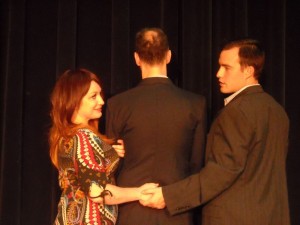 stage, Ford has been heard to ask, “What time is it? Let’s go to work!” well in advance of curtain time.
stage, Ford has been heard to ask, “What time is it? Let’s go to work!” well in advance of curtain time.
Betrayal gives each of these actors the chance to stretch their theatrical boundaries and push their artistic envelopes. “Any live theater is like a living organism,” Recca explains, waxing philosophically. “It’s constantly changing and you’re discovering things [you didn’t appreciate before] every time you do it.”
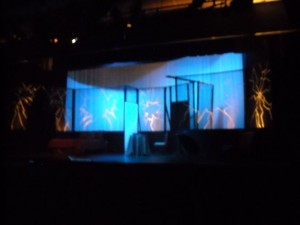 That said, Betrayal is filled with memorable show-stealing scenes. Recca turns in a boffo performance as a wine-guzzling drunken Robert coming to terms with his friend’s betrayal of their long-standing friendship. (“I’ve done lots of research,” jokes Recca of the authenticity he brings to the scene.) Ford displays range and versatility throughout the play’s nine acts, but nowhere does she simmer and spark more than in her bedroom
That said, Betrayal is filled with memorable show-stealing scenes. Recca turns in a boffo performance as a wine-guzzling drunken Robert coming to terms with his friend’s betrayal of their long-standing friendship. (“I’ve done lots of research,” jokes Recca of the authenticity he brings to the scene.) Ford displays range and versatility throughout the play’s nine acts, but nowhere does she simmer and spark more than in her bedroom 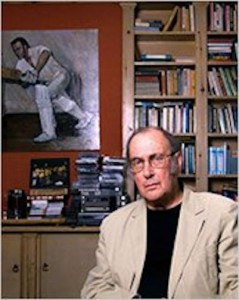 scene with husband Robert. (It’s not what you think.) And although Jerry is Sofranko’s very first dramatic role, he brings a subtlety and lightheartedness to the character that is sure to captivate even the most critical theater-goer, especially during his jaw-rippling scene where Emma tells him she is pregnant.
scene with husband Robert. (It’s not what you think.) And although Jerry is Sofranko’s very first dramatic role, he brings a subtlety and lightheartedness to the character that is sure to captivate even the most critical theater-goer, especially during his jaw-rippling scene where Emma tells him she is pregnant.
Without question, Pinter provides the actors with delectably layered, nuanced and complex characters, stabbing, shanking and entendre-filled lines coupled with legendary scripted pregnant pauses that draw the audience to the edge of their seats. But it is Pinter’s reverse chronology storytelling that 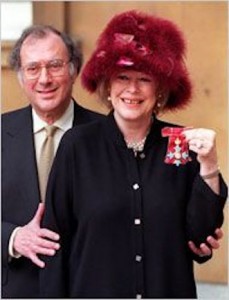 keeps the actors in the moment and operating at the pinnacle of their stagecraft. “It’s really pretty difficult,” Ford concedes. “You constantly have to ask yourself, ‘What do I know right now? I don’t know a minute ahead or a minute ago. I only know what’s happening right now.'”
keeps the actors in the moment and operating at the pinnacle of their stagecraft. “It’s really pretty difficult,” Ford concedes. “You constantly have to ask yourself, ‘What do I know right now? I don’t know a minute ahead or a minute ago. I only know what’s happening right now.'”
“It really makes you focus on being in the scene, in being in the moment,” Sofranko agrees.
Still, Recca had misgivings. “To have already given away the ending makes you wonder where [the story] is going from there.” But that’s the allure of Pinter’s seduction. “Have you ever seen  something and wondered how did that happen?” asks Ford by way of explanation. “Well, that’s the secret to why this play resonates so well with the actors and with its audiences.”
something and wondered how did that happen?” asks Ford by way of explanation. “Well, that’s the secret to why this play resonates so well with the actors and with its audiences.”
Resonate indeed. This is a spellbinding, mesmerizing performance by an ensemble cast. So rearrange you plans for the weekend to include this show. It’s not just good, intellectually stimulating theater. It will get you thinking about a wide variety of topics from loyalty, honesty and living in the moment to the fragility of memory and the tenuousness of our relationships with those who are most important in our lives.
Individual tickets are $22 each. Student tickets are $11. Thursdays are “buy one get one half off,” and opening night is “pay what you will” – you name the ticket price!
_______________________________________________________________
Theatre Conspiracy’s ‘Betrayal’ continues tonight at the Alliance (10-10-14)
 Theatre Conspiracy continues its run of Harold Pinter’s masterpiece, Betrayal, tonight. The show runs through October 18 at the Foulds Theatre inside the Lee County Alliance for the Arts.
Theatre Conspiracy continues its run of Harold Pinter’s masterpiece, Betrayal, tonight. The show runs through October 18 at the Foulds Theatre inside the Lee County Alliance for the Arts.
“We begin at the end, with a nine-year love affair between a literary agent and his best friend’s wife unraveling in reverse chronological order,” notes director Rick Sebastian. However, hindsight is 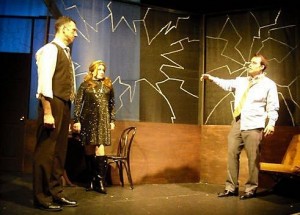 anything but 20/20 for each of these characters. The stakes are high for two families and three relationships as Pinter explores issues of fidelity, reproduction, friendship, betrayal, and unfathomable human behavior.
anything but 20/20 for each of these characters. The stakes are high for two families and three relationships as Pinter explores issues of fidelity, reproduction, friendship, betrayal, and unfathomable human behavior.
Emma is married to Robert, a publisher. But for seven years, she has been having an affair with Jerry, a literary agent and Robert’s best friend. 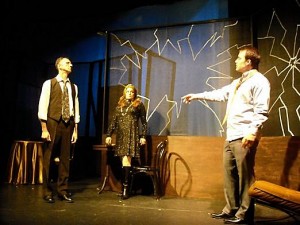 Betrayal begins after the end of the affair, and pursues an intricate, gripping journey back to its very beginning. In a brilliant device, time is turned upside down as the play charts significant events in reverse.
Betrayal begins after the end of the affair, and pursues an intricate, gripping journey back to its very beginning. In a brilliant device, time is turned upside down as the play charts significant events in reverse.
A ruthless exploration of the complexity of the human heart, Betrayal is Pinter’s most accessible work, enthralling and provocatively layered. Greg  Sofranco and Pattie Ford play the lovers Jerry and Emma. They are joined by James Recca as Emma’s husband, Robert, and Ken Ruisi as the Waiter. Directing this production is Rick Sebastian.
Sofranco and Pattie Ford play the lovers Jerry and Emma. They are joined by James Recca as Emma’s husband, Robert, and Ken Ruisi as the Waiter. Directing this production is Rick Sebastian.
Individual tickets are $22 each. Student tickets are $11. Performances are Thursday, Friday and Saturday at 8 p.m. with one Sunday matinee on October 12 at 2 p.m. Thursdays are “buy one get one half off.”
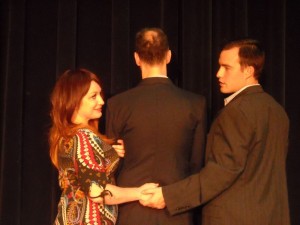 Season subscriptions are available. You can buy:
Season subscriptions are available. You can buy:
- the remaining 7 SHOWS FOR $112 ($16 per ticket); or
- 6 SHOWS FOR $102 ($17 per ticket); 0r
- 5 SHOWS FOR $90 ($18 per ticket); or
- 4 SHOWS FOR: $80 ($20 per ticket).
Tickets can be purchased by calling Theatre Conspiracy’s box office at 239-936-3239 or by visiting www.theatreconspiracy.org.
________________________________________________________________________
Theatre Conspiracy director Rick Sebastian dishes on Harold Pinter’s ‘Betrayal’ (09-30-14)
 This Friday (October 3), Betrayal opens at Theatre Conspiracy. “It is a modern play from Pulitzer Prize winning playwright Harold Pinter,” notes Rick Sebastian, who directs the 4-actor production. “It reveals how we all believe, trust, disappoint, and then accept too much for what we think we want and need.”
This Friday (October 3), Betrayal opens at Theatre Conspiracy. “It is a modern play from Pulitzer Prize winning playwright Harold Pinter,” notes Rick Sebastian, who directs the 4-actor production. “It reveals how we all believe, trust, disappoint, and then accept too much for what we think we want and need.”
The story starts two years after the end of a 7-year affair between Emma (played by Patti Ford) and her husband’s best friend, Jerry (played by Greg Sofranco). “Pinter has structured the play from the end going back in time to the beginning,” Sebastian points out. “In this format. the audience views the outcome before learning the how’s and why’s.”
 It may sound complicated and unconventional, but Betrayal ha long been regarded Pinter’s most accessible play. And the Foulds Theatre at the Alliance for the Art is the perfect venue for this cozy cast and one-room production, which is as much about the relationship between the two men as it is about Emma and Jerry’s clandestine meetings or forgetful moments.
It may sound complicated and unconventional, but Betrayal ha long been regarded Pinter’s most accessible play. And the Foulds Theatre at the Alliance for the Art is the perfect venue for this cozy cast and one-room production, which is as much about the relationship between the two men as it is about Emma and Jerry’s clandestine meetings or forgetful moments.
 The play is based on Pinter’s real life affair with British television newscaster Joan Bakewell and simultaneous fast friendship with her husband, Michael (played by James Recca). But the BBC radio producer was far from a clueless sop. Michael Bakewell actually knew about the affair for two years before he confronted Pinter and his wife, and that, ironically, caused Pinter to feel betrayed himself.
The play is based on Pinter’s real life affair with British television newscaster Joan Bakewell and simultaneous fast friendship with her husband, Michael (played by James Recca). But the BBC radio producer was far from a clueless sop. Michael Bakewell actually knew about the affair for two years before he confronted Pinter and his wife, and that, ironically, caused Pinter to feel betrayed himself.
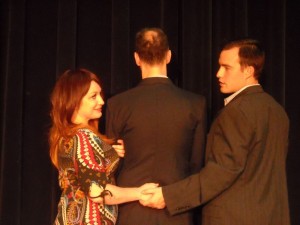 “Betrayals occur in many ways throughout the play,” observes Sebastian, who promises that the audience will get to see how each character’s “actions, plans, thoughts and feelings change” as they are moved, in turn, by the others’ interconnected layers of duplicity and betrayal.
“Betrayals occur in many ways throughout the play,” observes Sebastian, who promises that the audience will get to see how each character’s “actions, plans, thoughts and feelings change” as they are moved, in turn, by the others’ interconnected layers of duplicity and betrayal.
While Betrayal is the first play he’s directed at  Theatre Conspiracy, Sebastian has been directing shows on Fort Myers Beach for the past three years. He has also appeared in many Theatre Conspiracy shows over the years as an actor, including Marjorie Kinnan Rawlingand’s husband, Chrsylis, in School for Wives, and as a very human dog in Domestic Tranquility.
Theatre Conspiracy, Sebastian has been directing shows on Fort Myers Beach for the past three years. He has also appeared in many Theatre Conspiracy shows over the years as an actor, including Marjorie Kinnan Rawlingand’s husband, Chrsylis, in School for Wives, and as a very human dog in Domestic Tranquility.
It was Theatre Conspiracy Artistic Director Bill Taylor who helped Sebastian get the acting bug. “I started acting under the direction of Richard Westlake when I went back to study at Edison Community College (now Florida SouthWestern State College),” recalls Rick. “My first role was as Bill Taylor’s older brother in Table Settings by James Lapine. That was in 1982! Once bitten, I performed with several local 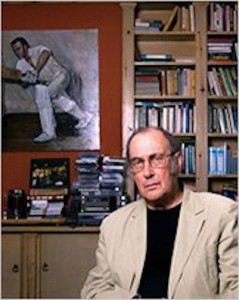 theatre companies from Cape Coral to the Old Pirate Playhouse on Sanibel” before leaving for Boston and New York to work in television and film.
theatre companies from Cape Coral to the Old Pirate Playhouse on Sanibel” before leaving for Boston and New York to work in television and film.
In 1988, Sebastian entered Florida Atlantic University to study acting and directing. “At F.A.U., I studied with Zoe Caldwell and her husband, Robert Whitehead,” Rick name drops. But Sebastian is not content to merely direct. “Next, I will become a producer, bringing the play Love, Loss and What I Wore by Nora and Delia Ephron to the Beach. Hopefully, the beginning of bringing more Theatre to Fort Myers Beach.”
Continuing reading below for more about playwright Harold Pinter and Theatre Conspiracy’s production of Betrayal, opening October 3.
______________________________________________________
For ‘Betrayal’ playwright Harold Pinter, art followed life (09-23-15)
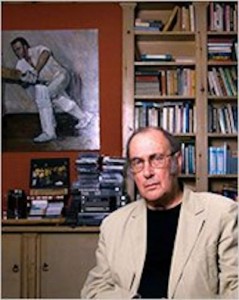 In spite of opening to mixed reviews in 1978, Sam Spiegel thought that Harold Pinter’s Betrayal would make a terrific movie. With Pinter adapting the play for film, Spiegel went into production with David Jones directing, unknown British actress Patricia Hodge starring as Emma, Ben Kingsley playing her seemingly clueless husband, Robert, and Moonlighting’s Jeremy Irons cast as Robert’s best friend and Emma lover of seven years, Jerry. But the filming turned out to be a tense affair after Spiegel improvidently commented publicly that Betrayal was based on events in Pinter’s life.
In spite of opening to mixed reviews in 1978, Sam Spiegel thought that Harold Pinter’s Betrayal would make a terrific movie. With Pinter adapting the play for film, Spiegel went into production with David Jones directing, unknown British actress Patricia Hodge starring as Emma, Ben Kingsley playing her seemingly clueless husband, Robert, and Moonlighting’s Jeremy Irons cast as Robert’s best friend and Emma lover of seven years, Jerry. But the filming turned out to be a tense affair after Spiegel improvidently commented publicly that Betrayal was based on events in Pinter’s life.
Pinter rebuked Spiegel and repudiated the allegation. “That is a 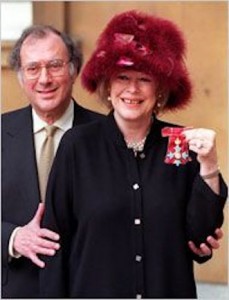 fantasy on Mr. Spiegel’s part,” Pinter told Roger Ebert flatly soon after. “I was much more interested in the friendship between the two men than in the ‘affair’ aspects of the story.” But as the Bard famously noted in Hamlet, Pinter doth protested too much, and in her 2010 memoire, Must You Go?: My Life with Harold Pinter, the playwright’s second wife, Lady Antonia Fraser, confirmed that Pinter based the play on an affair he’d had with television newscaster Joan Bakewell in the 1960s.
fantasy on Mr. Spiegel’s part,” Pinter told Roger Ebert flatly soon after. “I was much more interested in the friendship between the two men than in the ‘affair’ aspects of the story.” But as the Bard famously noted in Hamlet, Pinter doth protested too much, and in her 2010 memoire, Must You Go?: My Life with Harold Pinter, the playwright’s second wife, Lady Antonia Fraser, confirmed that Pinter based the play on an affair he’d had with television newscaster Joan Bakewell in the 1960s.
Pinter met Bakewell at a London party in 1960. Although he was married at the time to actress Vivien Merchant and Joan was wed to BBC radio producer Michael Bakewell, the two began a torrid  affair. And in spite of their clandestine tryst, Pinter also became fast friends with his lover’s husband until Michael revealed one day that he’d known about Joan and Pinter’s affair for more than two years. But rather than expressing shame, embarrassment, regret or even chagrin, Pinter was outraged that Michael had held his tongue for so long. “I remember vividly Harold’s indignation at
affair. And in spite of their clandestine tryst, Pinter also became fast friends with his lover’s husband until Michael revealed one day that he’d known about Joan and Pinter’s affair for more than two years. But rather than expressing shame, embarrassment, regret or even chagrin, Pinter was outraged that Michael had held his tongue for so long. “I remember vividly Harold’s indignation at  the fact that I had known for a long time about the affair without saying anything,” Michael Bakewell said in Michael Billington’s 2007 biography Harold Pinter. “I think he personally felt betrayed.”
the fact that I had known for a long time about the affair without saying anything,” Michael Bakewell said in Michael Billington’s 2007 biography Harold Pinter. “I think he personally felt betrayed.”
Betrayal has a way of coming full circle. Pinter converted the experiences of his real-life love triangle into a play, and when he was done writing 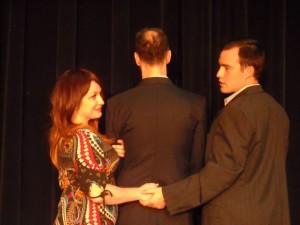 it, he sent the completed script to his ex-lover. Joan Bakewell was aghast. “The play portrayed many of the events of the affair between us with an accuracy verging on the literal,” Bakewell later recounted. “At the time when he first sent me the script, I was deeply distressed to have our private affair so glaringly presented on stage.”
it, he sent the completed script to his ex-lover. Joan Bakewell was aghast. “The play portrayed many of the events of the affair between us with an accuracy verging on the literal,” Bakewell later recounted. “At the time when he first sent me the script, I was deeply distressed to have our private affair so glaringly presented on stage.”
Regardless of its etiology, Betrayal is widely  accepted as one of Pinter’s masterworks – along with The Birthday Party, The Caretaker and The Homecoming. In these and some 30 other plays, Pinter poignantly captured the anxiety and ambiguity of life in the second half of the 20th century with terse, hypnotic dialogue filled with gaping pauses and the prospect of imminent violence. “Pinter became one of the few modern playwrights whose name instantly evoked a sensibility,” wrote New York Times critics Mel Gussow and Ben Brantley following the playwright’s death in 2008. “The adjective Pinteresque has become part of the cultural vocabulary as a byword for strong and unspecified menace.”
accepted as one of Pinter’s masterworks – along with The Birthday Party, The Caretaker and The Homecoming. In these and some 30 other plays, Pinter poignantly captured the anxiety and ambiguity of life in the second half of the 20th century with terse, hypnotic dialogue filled with gaping pauses and the prospect of imminent violence. “Pinter became one of the few modern playwrights whose name instantly evoked a sensibility,” wrote New York Times critics Mel Gussow and Ben Brantley following the playwright’s death in 2008. “The adjective Pinteresque has become part of the cultural vocabulary as a byword for strong and unspecified menace.”
Pinter’s plays often take place in a ubiquitously claustrophobic room, where conversation is a minefield and even innocuous-seeming words can wound. “Words are weapons that the characters use to discomfort or destroy each other,” said Peter Hall, who has staged more of Pinter’s plays than any other director.
“But while Mr. Pinter’s linguistic agility turned simple, sometimes obscene, words into dark, glittering and often mordantly funny poetry, it is what comes between the words that he is most famous for,” observe Gussow and Brantley. “And the stage direction ‘pause’ would haunt him throughout his career. Intended as an instructive note to actors, the Pinter pause was a space for emphasis and breathing room. But it could also be as threatening as a raised fist. Pinter would later say that writing the word “pause” into his first play was “a fatal error.” It is certainly the aspect of his writing that has been most parodied. But no other playwright has consistently used pauses with such rhythmic assurance and to such fine-tuned manipulative effect.
Betrayal was one of three plays that Pinter set in the worlds of art and publishing. Old Times (1971), No Man’s Land (1975) and Betrayal each study the unreliability of memory and the uncertainty of love. In Old Times, a husband and wife encounter a woman they may or may not have known in the past. In No Man’s Land, a faded poet visits a wealthy patron for an evening of recollection and gamesmanship. And Betrayal, of course, a play about marriage and duplicity, is among Pinter’s most accessible works.
And most popular.
Last year, a reprisal of the play grossed $17.5 million, making it the second biggest non-musical hit of 2013 in New York. Okay. Okay. The fact that Daniel Craig starred as Robert may have played a small role in the play’s financial success. He, of course, is Bond, James Bond, to most of us — a man widely perceived, especially by women of a certain age, as the hunkiest actor in movies. And for the men in the audience, it didn’t hurt that Craig played opposite his real-life wife, the beautiful, Oscar-winning movie star Rachel Weisz (heroine of the cult horror film The Mummy).
But judge for yourself. Theatre Conspiracy’s production of Harold Pinter’s Betrayal opens in the Foulds Theatre at the Alliance for the Arts on October 3.
__________________________________________________________________________________
‘Betrayal’ explores issues of fidelity, friendship, betrayal and unfathomable human behavior (09-21-14)
 Theatre Conspiracy continues its 21st anniversary season with the winner of the Laurence Olivier Award for Best New Play, the Harold Pinter masterpiece, Betrayal. The show opens October 3, 2014 at the Alliance for the Arts’ Foulds Theatre.
Theatre Conspiracy continues its 21st anniversary season with the winner of the Laurence Olivier Award for Best New Play, the Harold Pinter masterpiece, Betrayal. The show opens October 3, 2014 at the Alliance for the Arts’ Foulds Theatre.
This story begins at the end … the seven-year love affair between a literary agent and his best friend’s wife unravels in reverse chronological order.  However, hindsight is anything but 20/20 for each of these characters. The stakes are high for two families and three relationships as Pinter explores issues of fidelity, reproduction, friendship, betrayal, and unfathomable human behavior.
However, hindsight is anything but 20/20 for each of these characters. The stakes are high for two families and three relationships as Pinter explores issues of fidelity, reproduction, friendship, betrayal, and unfathomable human behavior.
Emma is married to Robert, a publisher. But for seven years, she has been having an affair with Jerry, a literary agent and Robert’s best friend.  Betrayal begins after the end of the affair, and pursues an intricate, gripping journey back to its very beginning. In a brilliant device, time is turned upside down as the play charts significant events in reverse. A ruthless exploration of the complexity of the human heart, Betrayal is Pinter’s most accessible work, enthralling and provocatively layered.
Betrayal begins after the end of the affair, and pursues an intricate, gripping journey back to its very beginning. In a brilliant device, time is turned upside down as the play charts significant events in reverse. A ruthless exploration of the complexity of the human heart, Betrayal is Pinter’s most accessible work, enthralling and provocatively layered.
Greg Sofranco and Pattie Ford play lovers Jerry and Emma. They are joined by James Recca as Emma’s husband, Robert, and Ken Ruisi as the Waiter. Directing this production is Rick Sebastian.














 Tom Hall is both an amateur artist and aspiring novelist who writes art quest thrillers. He is in the final stages of completing his debut novel titled "Art Detective," a story that fictionalizes the discovery of the fabled billion-dollar Impressionist collection of Parisian art dealer Josse Bernheim-Jeune, thought by many to have perished during World War II when the collection's hiding place, Castle de Rastignac in southern France, was destroyed by the Wehrmacht in reprisal for attacks made by members of the Resistance operating in the area. A former tax attorney, Tom holds a bachelor's degree as well as both a juris doctorate and masters of laws in taxation from the University of Florida. Tom lives in Estero, Florida with his fiancee, Connie, and their four cats.
Tom Hall is both an amateur artist and aspiring novelist who writes art quest thrillers. He is in the final stages of completing his debut novel titled "Art Detective," a story that fictionalizes the discovery of the fabled billion-dollar Impressionist collection of Parisian art dealer Josse Bernheim-Jeune, thought by many to have perished during World War II when the collection's hiding place, Castle de Rastignac in southern France, was destroyed by the Wehrmacht in reprisal for attacks made by members of the Resistance operating in the area. A former tax attorney, Tom holds a bachelor's degree as well as both a juris doctorate and masters of laws in taxation from the University of Florida. Tom lives in Estero, Florida with his fiancee, Connie, and their four cats.